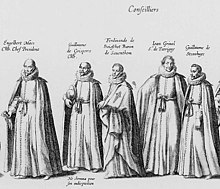
The Privy Council or Secret Council (Dutch: Geheime Raad, French: Conseil Privé) was one of the three "collateral councils" (along with the Council of Finance and Council of State) that together formed the highest government institutions of the Habsburg Netherlands. Based in Brussels, it was particularly charged with legal and administrative questions.
History
The Council was founded on 1 October 1531 by Emperor Charles V. He prescribed a president, eight councillors, and a secretary.
Philip V of Spain abolished the council in 1702, but it was later restored by the archduchess-governess Maria Christina, Duchess of Teschen and finally abolished by the Brabant Revolution.
Personnel
Presidents
- 1531-1540: Jean Carondelet.
- 1531-1540: Pieter Tayspil
- 1540-1548: Lodewijk van Schore
- 1549-1569: Viglius van Aytta
- 1569-1573: Charles de Tisnacq
- 1573-1575: Viglius van Aytta
- 1575-1583: Arnoud Sasbout
- 1587-1592: Willem van Pamele
- 1592-1595: Jan van der Burch
- 1597–1609: Jean Richardot
- 1614–1630: Engelbert Maes
- 1632–1653: Pieter Roose
- 1653–1671: Charles de Hovyne
- 1672–1684: Léon-Jean de Paepe
- 1684-1694: Pieter Frans Blondel
- 1694-1702: Albert de Coxie, baron of Moorsele.
- 1725-1732: Christophe-Ernest, 1st Count of Baillet
- 1733-1739: Jean Alphonse, 1st Count de Coloma
- 1739-1758: Gilles-Augustin de Steenhault
Councillors
- Ferdinand van Boisschot
- Jean Grivel
- Guillaume de Grysperre
- Antoine Reniers
- Louis-Alexander Scockart
- Willem van Steenhuys
Secretary
See also
- Council of Brabant
- Council of Flanders
- Council of Luxembourg
- Council of Troubles
- Great Council of Mechelen
- Supreme Council of Flanders
References
- Paul F. State, Historical Dictionary of Brussels (2015), p. 393.
- Georges Martyn, "How 'Sovereign' were the Southern Netherlands under the Archdukes?", in The Twelve Years Truce (1609): Peace, Truce, War and Law in the Low Countries at the Turn of the 17th Century, edited by Randall Lesaffer (Leiden and Boston, 2014), p. 201.
- Geheime Raad (1531-1578), Huygens Institute for the History of the Netherlands. Accessed 3 April 2017.
This Belgian history-related article is a stub. You can help Misplaced Pages by expanding it. |
This Holy Roman Empire–related article is a stub. You can help Misplaced Pages by expanding it. |